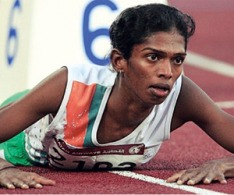This web page was produced as an assignment for Genetics 677, an undergraduate course at UW-Madison.
Is she a woman?
I chose the scientific article based on the popular press article. I do not know what is contributing to Santhi Soundararajan intersexualism. It is irrelevent what syndrome led to it, however. She was stripped of her metals because she has a Y chromosome. Like I said before, there may not be any phenotypic difference between her and any other female athlete. The article that I read as well as the articles I read to gather more information to comment on the article I read both stated that there is little to know difference between a complete androgen insentive woman and an XX woman (1, 2).
As stated in Drummond et al., these women experience estrogen levels comparable to that of genetically normal women (2). The testosterone that is not used to masculinize the body is converted to estrogen. In the article which is a reaction to the event, he mentions that a Y chromosome does not convey some special advantage to a phenotypic woman necessarily. The literature that I have read thus far indicates the same for CAIS at least. It seems likely that Santhi Soundararajan has a intersexual syndrome similar to or complete androgen insensitivity syndrome (CAIS) as she was surprised as well by the diagnosis. In the popular press article, the author did not have facts to back up his assertions. However, the literature clearly shows that this can be the case.
Alogether, these two articles should agree that women with a Y chromosome should not be denied opportunities as they are phenotypically female. The author used mostly argumentation to argue against the act of taking her medals. However, in this case, the arguments could be easily backed up by biological fact. Because of this evidence, I think that it should be brought to the attention of international sports leagues with this policy. They are unnecessarily discriminating against a people for no other reason than they are different genetically.
References
1. Wisniewski, A., Migeon, C., Meyer-Bahlburg, H., Gearhart, J., Berkovitz, G., Brown, T., Money, J. (2000). Complete Androgen Insensitivity Syndrome: Long-Term Medical, Surgical, and Psychosexual Outcome. Clinical Endocrinology and Metabolism 85(8). Retrieved from: http://jcem.endojournals.org/cgi/content/abstract/85/8/2664
2. Hines, M., Ahmed, S., Hughes, I. (2003). Psychological Outcomes and Gender-Related Development in Complete Androgen Insensitivity Syndrome. Archives of Sexual Behaviors 32(2). doi: 10.1023/A:1022492106974
Website authored by Sam Trammell. Email: [email protected]. Last updated: March 13, 2009.


